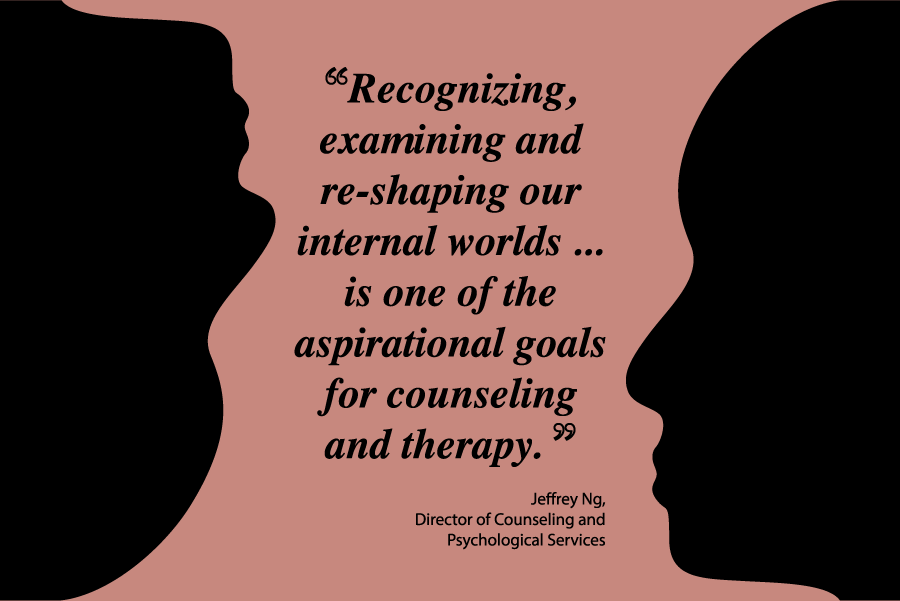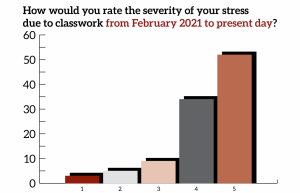What Science Says About Self-Talk
It is perfectly normal to talk to yourself, although the practice can become unhealthy
October 29, 2021
From an internal dialogue to audibly talking to your reflection in the mirror, we all communicate with ourselves in some form or another. Those who talk to themselves are no less normal than anyone else. In fact, talking to yourself has been linked to sharpening memory and increasing one’s overall self-confidence.
Self-talk can become unhealthy, and it is important to distinguish when it crosses this line.
What It Means To Talk to Yourself
Self-talk is defined as the constant internal dialogue that most, if not all, human beings experience. Self-talk stems from the combination of our conscious and unconscious desires in response to external stimuli. While psychologists and neuroscientists still struggle to fully understand the inner workings of the human brain, it is widely accepted that the prefrontal cortex and amygdala greatly influence one’s sense of identity on a personal and social level.
Human beings are inherently social creatures. Compared to other mammals, the human brain has a highly developed prefrontal cortex that houses our cognitive and social abilities. This segment of the brain shapes our personalities.
Another uniquely complex brain segment, the amygdala, regulates our anxiety and stress responses, such as our fight-or-flight response. Humans’ amygdalas play a major part in our social interactions and are responsible for anxiety. Any stimulus can cause this feeling, from sudden loud noises to complicated social events.
When Self-Talk Turns Bad
Those with lower self-esteem and who experience more stress are more likely to foster a negative dialogue with themselves. This creates a positive feedback loop where one is consistently overwhelming oneself with stress and anxiety due to recurrent negative thoughts.
Social media and virtual forms of communication can be equally damaging for one’s mental health.
Jeffrey Ng, director of Fordham’s Counseling and Psychological Services (CPS), reassured that “we all have these experiences of ‘negative’ self-talk” due to our social nature as human beings. It is when we begin to believe these intrusive thoughts that they can degrade our feelings of self-worth.
“This kind of talk usually originates from external sources,” such as family members, friends or even complete strangers, explained Ng.
Social media and virtual forms of communication can be equally damaging for one’s mental health, as exposure to artificially tailored lifestyles seen online are inevitably internalized. These self-directed criticisms often result in “anxiety, depression, decreased self-esteem, distorted perceptions, and general feelings of distress,” according to Ng.
How to Promote Positive Self-Talk
Ng recommends building positive inner dialogue with yourself to “facilitate the repeated, non-judgmental awareness of our negative self-talk.” He recommended mindfulness activities like yoga, meditation or exercise, which help build a positive self-image and develop a better relationship with oneself.
Thought replacement, literally the phasing out of a typically negative thought with a more positive one, is a common technique taught in cognitive behavioral therapy.
Thought replacement, literally the phasing out of a typically negative thought with a more positive one, is a common technique taught in cognitive behavioral therapy, and has been proven to alleviate anxiety even in individuals suffering from anxiety disorders.
“Recognizing, examining and re-shaping our internal worlds (our thoughts, feelings, self-narratives, self-dialogue, perceptions, etc) is one of the aspirational goals for counseling and therapy, which is one of the primary services that we offer at CPS,” Ng said. The university offers therapy sessions with CPS staff members on weekdays.
CPS additionally offers counseling sessions and mindfulness workshops, which, according to Ng, “focus on developing non-judgmental awareness of our internal experiences, increasing our moment to moment attention, and detaching from all the external ‘noise’ that contribute to our negative self-talk.”
Whether internal or external, your self-dialogue highly influences your mental state. Shifting your negative thoughts into supportive conversations will improve your mental fortitude and mood. You will also find a new friend within yourself.

















